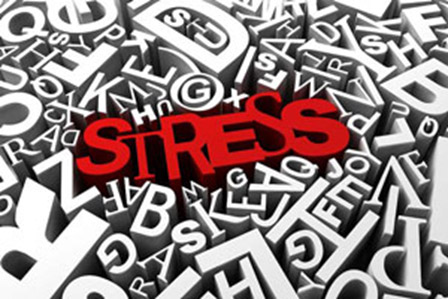Stress is one of those human instinctive survival mechanisms that Allah (SWT) has bestowed upon us. It keeps us on our toes so that we can respond to immediate demands with a quick release of energy, such as when we must brake suddenly to avoid hitting an animal or another car.
When our children are in physical danger, we protect them in ways that would not be feasible under normal circumstances.
The heart beats rapidly, our rate of breathing increases, and perspiration starts to flow during such responses. Once the danger is gone, we begin to relax.
Commonly known as the ‘fight or flight’ reflex, we live in a state of alert; however, the competitive world we live in greatly increases the demands on this survival mechanism.
Our modern lives are full of constant changes and constant decisions; and fear, impatience, ambition, dissatisfaction, and everyday human rights issues prolong the sense of danger we experience in emergencies so that what was a natural reflex begins to wear on our physical, psychological and spiritual bodies.
When we are increasingly feeling bad, consciously or unconsciously, it darkens our human energy fields.
Harmful Effects of Stress
 During stress, the adrenal glands release adrenaline for longer periods of time, the heart beats faster and more irregularly, and the blood vessels contract to prevent blood loss in the extremities (fingers and toes).
During stress, the adrenal glands release adrenaline for longer periods of time, the heart beats faster and more irregularly, and the blood vessels contract to prevent blood loss in the extremities (fingers and toes).
The hypothalamus (hind-brain), which regulates rhythmic activity and physiological stability, prepares the body for action. The body retains sodium, which increases water retention.
These stress responses affect the body’s ability to assimilate what it needs. Fats and proteins typically stored in the liver, stomach, and skin are broken down and released as the body is misinformed that it requires further energy.
The stomach secretes more acid, but cannot resume its digestive function. Glands become both overactive and under-active, and the immune system becomes depleted.
Meanwhile, the various centers within our human energy fields become disorientated; if the stress is prolonged and we don’t get the required support from family, friends, and co-workers, it can result in damage to our defense mechanism – often exhibited as some form of mental illness. During extreme stress, one becomes irritated, easily angered or fatigued, lethargic and/or depressed.
 In the United States, the combined costs of stress-related disorders to the work industry from absenteeism, insurance and health costs, and diminished productivity are thought to run about $85 billion. The cost of stress-related coronary heart disease alone is $35 billion.
In the United States, the combined costs of stress-related disorders to the work industry from absenteeism, insurance and health costs, and diminished productivity are thought to run about $85 billion. The cost of stress-related coronary heart disease alone is $35 billion.
In Britain, at least 40 million working days are lost each year due to the effects of stress. It is estimated that stress-related illnesses cost the British medical and social services an average of 55 million sterling pounds per year, and account for a loss of 2 to 3% in the gross national product.
The Framingham heart study discovered that female clerical workers have high rates of heart disease. The workers who are most likely to suffer from stress-related illnesses are those who have 1) very psychologically demanding jobs; 2) little control over their work; and 3) very little social support (isolation from co-workers).
Stress also impacts those who suffer excessive monotony, boredom, or frustration because of insufficient stimulus or challenge, and they typically become ill frequently.
An increasing number of young Muslim women are recognizing this and are embracing the challenge of successfully completing their education and going on to gainful employment for their own self-development.
Other Causes of Stress
 Stress has environmental and chemical causes too. Although the initial response of caffeine and other stimulants in coffee, tea and cola drinks is to make us more alert, they also boost the output of stress hormones and, shortly after, they can cause feelings of irritability as well as sleeplessness.
Stress has environmental and chemical causes too. Although the initial response of caffeine and other stimulants in coffee, tea and cola drinks is to make us more alert, they also boost the output of stress hormones and, shortly after, they can cause feelings of irritability as well as sleeplessness.
Signs of stress include headaches, sleeping difficulties, muscle tension, water retention, lack of concentration, anxiety, fear and panic attacks, apathy and despair, social withdrawal, sexual difficulties, alcohol drinking, taking tranquilizers, eating too much or too little food, and smoking.
Prolonged stress can contribute towards long-term illnesses such as heart disease, diabetes, ulcers, cancer, asthma, and serious mental disorders.
Within the family, sources of stress include the arrival of an infant (often manifested in post-natal depression), menstruation and menopause, death, divorce, wedding preparations, children, fractious babies, problems with in-laws, and infidelity (as Muslims, we shouldn’t have this problem, but some do).
Stress can provide the opportunity for growth as Allah (SWT) often tests our abilities to cope with change and what it has to offer.
When we are optimistic and hopeful, we are more likely to experience stress as potentially positive. Emotion-focused activities enable us to manage distress more easily.
Cohn and Park, in their article entitled “Assessment and Prediction of Stress-Related Growth” in the Journal of Personality (1996) report that relying on one’s personal relationship with God and on religious social support strongly affects growth.
Different Perspectives
 Religious beliefs provide a framework in which we can appraise potentially threatening situations as challenging rather than intimidating.
Religious beliefs provide a framework in which we can appraise potentially threatening situations as challenging rather than intimidating.
It is when we lose ourselves in the demands of the material world and forget, even briefly, what we are in the scheme of Allah’s (SWT) universe that we set up a pattern for negative energy and pathological behavior that can become established within us.
Some current psychologists are arguing that stress does not exist. Dr. Rob Briner, an occupational psychologist at London University’s Birbeck College, believes that feeling bad at work is normal.
The book, The Stress Myth, written by psychologist Serge Doublet (U.S.), questions the validity of stress as a concept.
 He argues, “People feel ‘stressed’ because they believe in the first place that feeling ‘stressed’ is a legitimate condition… Without such a belief, the subjective feeling is not possible.”
He argues, “People feel ‘stressed’ because they believe in the first place that feeling ‘stressed’ is a legitimate condition… Without such a belief, the subjective feeling is not possible.”
Renowned psychoanalyst, C. J. Jung, seemingly responds to this when he says, “And if the psychologist happens to be a doctor who wants not only to classify his patient scientifically but also to understand him as a human-being, he is threatened with a conflict of duties between the two diametrically opposed and mutually exclusive attitudes of knowledge, on the one hand, and understanding on the other” (Routledge).
Surat Ali Imran (3), ayat 186, says, “You shall certainly be tried respecting your wealth and your souls, and you shall certainly hear – from those who have been given the Book before you and from those who are polytheist – much annoying talk; and if you are patient and guard (against evil), surely this is one of the affairs (which should be) determined upon.”
References:
- The Undiscovered Self: C.J. Jung.
This article was first published in 2001 and is currently republished for its importance.
